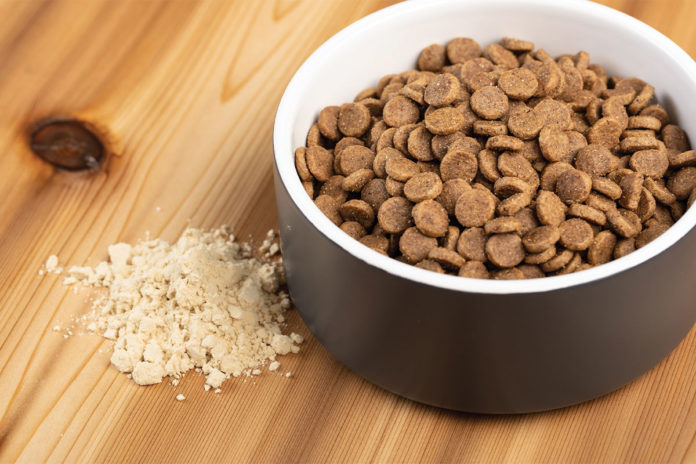Introduction
When it comes to pet nutrition, every ingredient matters. Our furry friends deserve the best, and one ingredient that’s gaining attention for its health benefits is gelatin. But what exactly is gelatin, and why should it be a part of your pet’s diet? In this article, we’ll explore the benefits of gelatin in pet food and how it can contribute to your pet’s overall well-being.
What is gelatin?
Gelatin is a natural protein derived from the collagen found in animal tissues, primarily bones and connective tissues. It’s commonly used in both human and pet foods for its gelling properties, but it’s much more than just a thickening agent. Gelatin provides a unique combination of amino acids, making it a valuable addition to your pet’s diet.
Nutritional Benefits of Gelatin for Pets
One of the main reasons gelatin is included in pet food is its high protein content. It contains a rich profile of amino acids, particularly glycine, proline, and hydroxyproline, essential for maintaining healthy joints, skin, and connective tissues in pets. These amino acids support your pet’s overall health, from improving digestion to promoting a shiny coat.
Health Benefits of Gelatin for Pets
Joint Health and Mobility: Gelatin is known for its ability to support joint health, making it particularly beneficial for aging pets or those with joint issues. The collagen in gelatin helps to maintain the integrity of cartilage, which can reduce the risk of joint pain and improve mobility.
Skin and Coat Improvement: The amino acids in gelatin are also vital for skin and coat health. Regular consumption of gelatin can lead to a shinier, healthier coat and improve the skin’s elasticity and hydration.
Bone Strengthening: Gelatin is rich in the nutrients that support bone health, such as calcium and phosphorus. This makes it an excellent ingredient for pets that need extra bone support, whether they’re growing puppies or aging dogs.
Gelatin as a Functional Ingredient in Pet Food
Beyond its nutritional benefits, gelatin serves as a functional ingredient in pet food. It improves the texture and palatability of pet food, making it more enjoyable for pets to eat. Gelatin is especially useful in wet pet foods, where it helps create a smooth, appealing texture that pets love.
Comparison with Other Pet Food Ingredients
Gelatin vs. Collagen: While both gelatin and collagen offer similar benefits, gelatin is more versatile in pet food applications due to its gelling properties. It’s also easier to digest, making it a preferable choice for many pets.
Gelatin vs. Common Protein Sources: Unlike common protein sources like chicken or beef, gelatin is free from allergens that might trigger sensitivities in some pets. It provides a hypoallergenic protein option for pets with food sensitivities.
How to Incorporate Gelatin into Your Pet’s Diet
Incorporating gelatin into your pet’s diet is easier than you might think. Many commercial pet foods now include gelatin as a key ingredient, so choosing a high-quality pet food that lists gelatin on the label is a great start. If you prefer to prepare homemade meals for your pet, you can add gelatin to their food to boost its nutritional value. Simply dissolve gelatin in water and mix it into their meals.
Potential Concerns and Considerations
While gelatin is generally safe for pets, it’s important to be aware of potential allergies and sensitivities. Always introduce gelatin gradually into your pet’s diet and monitor for any adverse reactions. Additionally, the quality and sourcing of gelatin are crucial; opt for gelatin sourced from reputable suppliers to ensure its purity and safety.
Case Studies: Pets Benefiting from Gelatin
Numerous pet owners and veterinarians have reported significant improvements in their pets’ health after adding gelatin to their diet. From enhanced mobility in senior dogs to shinier coats in cats, the benefits of gelatin are well-documented. Veterinarians often recommend gelatin for pets with joint issues or skin problems, citing its effectiveness as a natural remedy.
Conclusion
Gelatin is more than just a gelling agent; it’s a powerhouse of nutrients that can significantly enhance your pet’s health. From supporting joint health to improving skin and coat conditions, gelatin offers a range of benefits that make it a valuable addition to any pet’s diet. Whether you choose to incorporate it through commercial pet food or homemade meals, your pet is sure to reap the rewards of this versatile ingredient.
Frequently Asked Questions (FAQs)
Is gelatin safe for all pets?
Yes, gelatin is generally safe for all pets, but it’s always best to consult with your veterinarian before making any changes to your pet’s diet.
How Much Gelatin Should I Give My Pet?
The amount of gelatin depends on your pet’s size and dietary needs. Consult your veterinarian for specific recommendations.
Can gelatin help with aging pets?
Absolutely! Gelatin is particularly beneficial for aging pets as it supports joint health and mobility, which are common concerns in older animals.
What Are the Best Gelatin Sources?
Look for gelatin derived from high-quality animal sources, such as grass-fed bovine or free-range poultry, to ensure the best nutritional value for your pet.
Are There Any Side Effects?
While rare, some pets may experience digestive upset when first introduced to gelatin. Start with small amounts and gradually increase to avoid any issues.





Comments